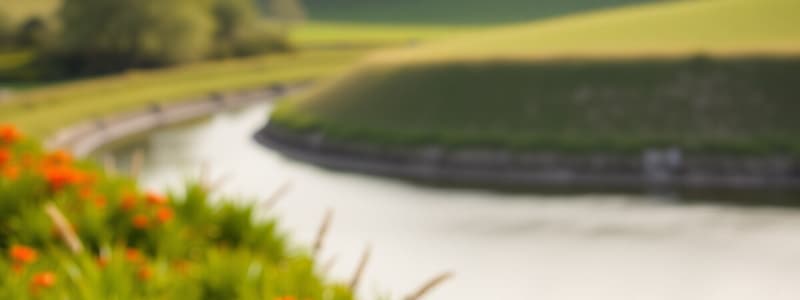Podcast
Questions and Answers
Was bedeutet 'Salut' auf Deutsch?
Was bedeutet 'Salut' auf Deutsch?
- Guten Tag
- Hallo (correct)
- Tschüss
- Auf Wiedersehen
Wie fragt man auf Französisch 'Wie geht es dir?'?
Wie fragt man auf Französisch 'Wie geht es dir?'?
- Comment allez-vous?
- Comment t'appelles-tu?
- Ça va? (correct)
- Quel âge as-tu?
Wie antwortet man auf Französisch auf die Frage 'Ça va?' wenn es einem gut geht?
Wie antwortet man auf Französisch auf die Frage 'Ça va?' wenn es einem gut geht?
- Merci
- Au revoir
- Non, ça ne va pas
- Oui, ça va (correct)
Was bedeutet 'Tu t'appelles comment?' auf Deutsch?
Was bedeutet 'Tu t'appelles comment?' auf Deutsch?
Wie fragt man auf Französisch nach dem Alter?
Wie fragt man auf Französisch nach dem Alter?
Wie sagt man 'sechs' auf Französisch?
Wie sagt man 'sechs' auf Französisch?
Welche Zahl kommt nach 'quatre' (vier) in der Zahlenreihe?
Welche Zahl kommt nach 'quatre' (vier) in der Zahlenreihe?
Welches Wort bedeutet 'elf' auf Französisch?
Welches Wort bedeutet 'elf' auf Französisch?
Was bedeutet 'le' im Französischen?
Was bedeutet 'le' im Französischen?
Was ist eine 'boulangerie'?
Was ist eine 'boulangerie'?
Was sind 'croissants'?
Was sind 'croissants'?
Was ist ein 'parc'?
Was ist ein 'parc'?
Was sind 'piscines'?
Was sind 'piscines'?
Was ist 'la Tour Eiffel'?
Was ist 'la Tour Eiffel'?
Flashcards
Salut!
Salut!
Hallo!
Ça va?
Ça va?
Wie geht es dir?
Oui, ça va.
Oui, ça va.
Ja, es geht mir gut.
Tu t'appelles comment?
Tu t'appelles comment?
Signup and view all the flashcards
Moi, c'est Valentin. Tu as quel âge?
Moi, c'est Valentin. Tu as quel âge?
Signup and view all the flashcards
J'ai...
J'ai...
Signup and view all the flashcards
Study Notes
- These notes are based on French language learning exercises.
Chat Completion Exercise
- The task is to complete a chat conversation with Valentin.
- Valentin initiates the conversation with "Salut!" (Hi!).
- Valentin asks "Ça va?" (How's it going?). A possible response is "Oui," (Yes).
- Valentin asks: "Tu t'appelles comment?" (What's your name?).
- Valentin introduces himself with "Moi, c'est Valentin." (I'm Valentin), before asking "Tu as quel âge?" (How old are you?). A possible response is "J'..." followed by your age.
Number Exercises
- The first number exercise involves separating mixed letters to find and circle number sequences.
- The second number exercise requires completing number sequences.
- Example 1: "quatre - cinq - six - huit - neuf -" needs completion, and might be filled with French numbers.
- Example 2: "un - cinq - sept onze" needs completion, and might be filled with French numbers.
- Example 3: " - dix - huit - deux" needs completion, and might be filled with French numbers.
Article Selection Exercise
- Choose the correct article (le/la/les, un/une/des) to complete sentences.
- Identify masculine and feminine articles (write masculine articles in blue, feminine in red).
- Example: "Qu'est-ce qu'il y a dans (le/la/les) quartier Bastille?".
- Example: "Il y a (un/une/des) boulangerie.".
- Sentences describe places and things available in a city.
Article Completion Exercise
- Using "Un, une ou des?" or "Le, la ou les?" complete the sentences, showing understanding of definite and indefinite articles.
- Example: Qu'est-ce qu'il y a dans quartier Bastille?
- Example: Il y a boulangerie. C'est boulangerie de Madame Ménard.
Question and Answer Exercise
- Posing and answering questions using provided sentence parts; connecting related question and answer sentence parts to form complete exchanges.
- The exercise focuses on what is available for different interests.
- Example: "Qu'est-ce qu'il y a pour... les fans de sport?" with the answer "Il y a... des stades et des piscines."
- Other questions include what there is for fans of science, drones, baguettes, nature, and Paris.
- Corresponding answers involve: bakeries, a drone shop, stadiums/pools, landmarks, parks and museums.
Vocabulary Exercise: City Features
- Exercise involves identifying and labeling places in a city.
- Examples: a bakery, a supermarket, the metro, a theatre, a hotel.
Sentence Construction Exercise
- The task is to construct sentences describing people based on photos from page 15 of a magazine.
- Sentence starters are provided such as: "Je trouve que..." and "À mon avis...".
- Adjectives are supplied to describe people, such as sympa, arrogant, autoritaire, calme, malheureux, perdu, étrange, timide, sensible, dur, sévère, and heureux.
- The verbs est and sont are provided to construct sentences in the present tense.
- Example: "À mon avis, Monsieur Mathieu est plutôt sympa."
Studying That Suits You
Use AI to generate personalized quizzes and flashcards to suit your learning preferences.


